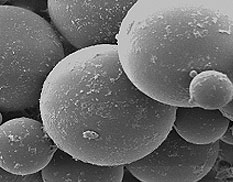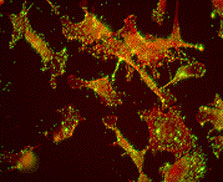Technology
Carigent Therapeutics has developed a novel technology for attaching high densities of application-specific molecules to the surfaces of biodegradable, polymeric particles ranging in size from tens of nanometers to hundreds of microns. The versatility of the platform enables the display of sophisticated combinations of ligands, adding new functionalities to biodegradable polymeric particles. To date, these functionalities include increased circulation times, enhanced contrast in a variety of imaging modalities, as well as cell, tissue, and organ-specific targeting. These surface modifications have proven to be robust, providing long-lasting presentation of ligands in a number of in vivo applications. The benefits of sustained-release, targeted delivery, and long-lasting high density surface functionalities position the Carigent technology as a premier drug delivery vehicle in a range of clinical therapeutic applications for cancer, cardiovascular, autoimmune and alloimmune disease.
Targeted Nanoparticle Platform
Carigent’s targeted nanoparticles incorporate an unprecedented and extraordinarily high density of surface ligands into established, well-characterized, safe materials and consist of the following components:

- Polymer matrix made of biodegradable, biocompatible polymers is designed to provide sustained-release of therapeutic payload
- Therapeutic payloads, which can be hydrophilic or hydrophobic in nature (e.g., small molecules, peptides, proteins, and nucleic acids such as siRNA) can be incorporated into Carigent nanoparticles.
- Surface functionalization provides an extraordinarily high density of anchor sites by which targeting ligands are attached using proprietary techniques
- Targeting Ligands enables recognition of specified targeted site and method by which Carigent nanoparticles bind to their intended target sites. Ligands can also be designed for other functions such as enhancing circulation time or attachment of antibodies.
Intellectual Property
The Carigent platform technology is founded on a broad suite of intellectual property which is the subject of an exclusive license from Yale and Cornell Universities. |




